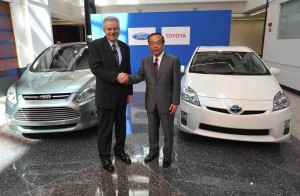Ford Motor Co. and Toyota Motor Corp. are joining forces in a 50-50 partnership aimed at developing the next generation of hybrid technologies specifically to bolster the fuel efficiency of pickup trucks and sport-utility vehicles.
The new partnership, a clear response to recent federal mandates requiring automakers to boost fuel economy to 54.5 miles per gallon by 2025 was triggered by a chance meeting in an airport lobby. As part of their new alliance, Toyota and Honda also plan to work together on advanced telematics systems that will pick up where today’s Ford Sync and Toyota Entune leave off.
Toyota and Ford are already the world’s two leading manufacturers of hybrid vehicles, the Japanese maker’s Prius sedan accounting for roughly half the gas-electric vehicles sold worldwide. But the challenge is to expand the technology to ensure that even the largest vehicles – like the Ford F-150 pickups and Toyota’s comparable Tunda truck – can deliver significantly better mileage.
“This agreement brings together the capability of two global leaders in hybrid vehicles and hybrid technology to develop a better solution more quickly and affordably for our customers,” said Derrick Kuzak, Ford group vice president, Global Product Development.
“This is the kind of collaborative effort that is required to address the big global challenges of energy independence and environmental sustainability,” added Ford President and CEO Alan Mulally.
The hybrid project is in its early stages, so the makers were reluctant to provide many details during a joint news conference, though they indicated it will result in an “all-new” rear-drive architecture.
Ford and Toyota have had some contact before on hybrids, though not necessarily in a positive vein. The U.S. maker reluctantly agreed to pay royalties to its Japanese rival, several years ago when Toyota argued that some of the technologies used in vehicles like the Ford Fusion Hybrid infringed on the Asian maker’s patents. This time, both seem eager to assist one another.
“Toyota is extremely proud to join Ford in developing a hybrid system for pickup trucks and SUVs. Not only is this tie-up clearly one aimed at making automobiles ever better, it should also become an important building block for future mobility in the U.S. By building a global, long-term relationship with Ford, our desire is to be able to continue to provide people in America automobiles that exceed their expectations,” Takeshi Uchiyamada, Toyota executive vice president, Research & Development said.
Rear-wheel-drive pickup trucks and SUVs are critical to Ford, but Toyota has also been pushing to become a more significant player, especially in the full-size pickup segment, going so far as to build a new plant in San Antonio to assemble the Tundra model. Light trucks currently make up nearly 20% of Toyota’s North American sales, despite an image as a maker of small, fuel-efficient passenger cars.
Both companies have been working independently on their own future-generation rear-wheel drive hybrid systems.
Under terms of the memorandum of understanding signed Monday, both companies have committed to collaborate as equal partners on the new hybrid system which aims to significantly boost fuel economy without compromising the capability customers require in their vehicles, Kuzak said.
“We expect to create exciting technologies that benefit society with Ford – and we can do so through the experience the two companies have in hybrid technology,” echoed Uchiyamada.
While the hybrid project is extensive and is aimed at developing significant new technologies, the telematics collaboration relates only to standards and technologies, and each company will continue to separately develop their own in-vehicle products and features. But the common goal is to come up with a more secure and more convenient in-car experience for next-generation telematics systems.
The new projects were put in motion after a chance meeting between Ford CEO Mulally and his Toyota counterpart Akio Toyoda. After exchanging business cards they met again then put their tech chiefs, Kuzak and Uchiyamada to work.
During their joint news conference the two makers said they did not foresee anti-trust problems. In fact, a similar joint effort to develop advanced hybrid technology briefly partnered General Motors, Daimler AG, Chrysler and Mercedes-Benz, though they have all since moved on to projects of their own.
Perhaps the biggest surprise from Monday’s announcement was the decision by Toyota to reach out despite its perceived hybrid leadership. But the maker has found the need to partner, of late, on more advanced technologies. It notably has formed a strong alliance with Silicon Valley start-up Tesla Motors to produce battery-electric vehicles, including a version of the RAV-4 crossover due to market next year.
Paul A. Eisenstein contributed to this report.


“…the two makers said they did not foresee anti-trust problems …a similar joint effort …partnered General Motors, Daimler AG, Chrysler and Mercedes-Benz…”
Wise collaborations (and attitudes in general) that provide them with more resources, more tools, more premises in order to make them more competitive in their endeavors to tackle opponents/competitors like Bill Gates and his OPOC engine.